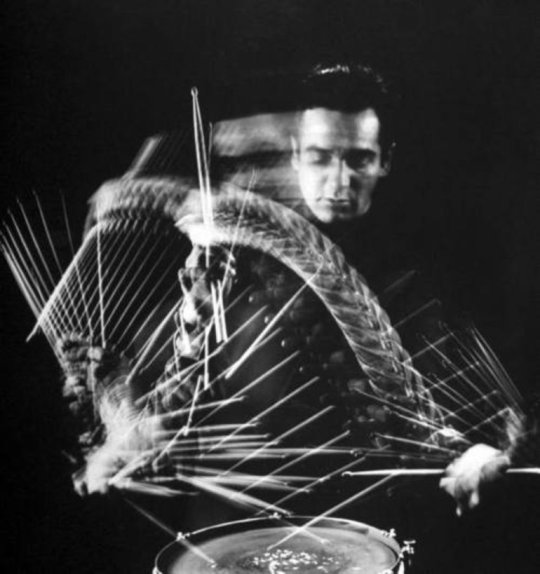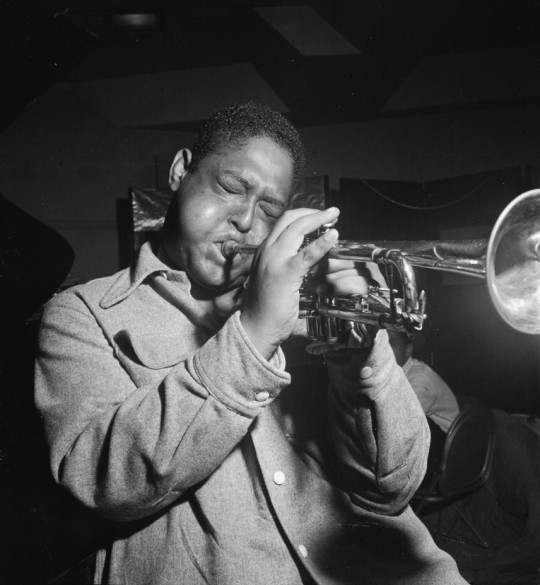#Roy Eldridge
Explore tagged Tumblr posts
Text


1960 - American Jazz Festival - Sportpalast in Berlin
Cannonball Adderley quintet
Dizzy Gillespie quintet
Jay Jay Johnson, Benny Carter, Coleman Hawkins, Stan Getz, Don Byas, Roy Eldridge, Jo Jones, Candido
#jazz#poster flyer#cannonball adderley#dizzy gillespie#j.j. johnson#benny carter#coleman hawkins#stan getz#don byas#roy eldridge#jo jones#candido#1960
19 notes
·
View notes
Text

LESTER YOUNG (left) AND ROY ELDRIDGE. JAZZ.
29 notes
·
View notes
Text

Thelonious Monk, Howard McGhee, Roy Eldridge et Teddy Hill à la sortie du club Minton's Playhouse - New York - Septembre 1947
Photo de William P. Gottlieb
#et pendant ce temps-là#musique#music#jazz#thelonious monk#howard mcghee#roy eldridge#teddy hill#william p. gottlieb#minton's playhouse#new york#états-unis#usa#09/1947#1947
5 notes
·
View notes
Text

Roy Eldridge – Rockin’ Chair
Rockin’ Chair is an album by American jazz trumpeter Roy Eldridge recorded in 1951 and 1952 and originally released on the Clef label.
Roy Eldridge – trumpet Buddy Tate – tenor saxophone Teddy Brannon, Oscar Peterson – piano Herb Ellis – guitar Clyde Lombardi, Ray Brown – bass Charlie Smith, J. C. Heard – drums
Unidentified orchestra conducted by George Williams
3 notes
·
View notes
Text
Wilbur Ware: The Bass Virtuoso Who Defined a Jazz Era
Introduction: Wilbur Ware was one of the most remarkable jazz bassists of his time. Though often understated in the history of jazz, his contributions to the genre have left a lasting impact on generations of musicians and listeners. Known for his unconventional playing style, rhythmic innovations, and the deep, resonant sound he coaxed from his instrument, Ware was a true original who left his…
#A Night at the "Village Vanguard"#Art Blakey#Clifford Jordan#Jazz Bassists#Jazz History#Roy Eldridge#Sonny Rollins#Sonny Stitt#Stuff Smith#Thelonious Monk#Thelonious Monk with John Coltrane#Wilbur Ware
3 notes
·
View notes
Video
youtube
(via Fish Market - Roy Eldridge (1945)
18 notes
·
View notes
Text
youtube
#chu berry#roy eldridge#sittin in#chu berry & his little jazz ensemble#music#clyde hart#danny barker#artie shapiro#big sid catlett#jazz#Youtube
3 notes
·
View notes
Text

📸 Art Kane
Front row, from left: Art Blakey, Marian McPartland, Miff Mole, Gene Krupa, Jimmy Rushing, Roy Eldridge, Max Kaminsky, Hilton Jefferson. Laughing on the right, up the stairs, is Dizzy Gillespie.
‘It would be sort of a graduation photo or class picture of all the jazz musicians. After I thought about it some more I decided they should get together in Harlem. After all, that’s where jazz started when it came to New York’
- Art Kane
#art kane#harlem#marian mcpartland#art blakely#miff mole#gene krupa#jimmy rushing#roy eldridge#max kaminsky#Hilton Jefferson#Dizzy Gillespie
5 notes
·
View notes
Text
GENE KRUPA

(English / Español)
Gene Krupa (January 15, 1909 - October 16, 1973) was a famed and influential American jazz musician and big band drummer, known and recognised for his energetic and brilliant playing style. His parents were Polish immigrants to the USA and he was born in Chicago, Illinois. He began his professional career in the mid-1920s with bands in Wisconsin. He emerged on the Chicago music scene in 1927, when he was selected by the MCA to become a member of the orchestra of Thelma Terry and Her Playboys, then the most notable American jazz band led by a woman.
Krupa made his first recording in 1927, with a band led by banjo player Eddie Condon. Krupa also appeared on six records by Thelma Terry's band in 1928. In 1929 he moved to New York City and worked with the Red Nichols band. In 1934 he joined Benny Goodman's band, where his unique drumming made him a national celebrity.
In 1938, after a public falling out with Goodman at the Earl Theater in Philadelphia, he left Goodman to launch his own band, with which he scored several big hits alongside singer Anita O'Day and trumpeter Roy Eldridge. Krupa made a memorable cameo appearance in the 1941 film Ball of Fire, in which he and his band played different versions of the hit song Drum Boogie.
In 1943, Krupa was arrested for possession of cannabis and briefly imprisoned.
Krupa retired musically in the late 1960s, although he played occasionally in public until his death from leukemia in Yonkers, New York. He was buried in Holy Cross Cemetery in Calumet City, Illinois. He became the face of Slingerland Drums, which later launched a "Radio King" series in Krupa's honour.
Krupa is considered by many to be the most influential drummer of the 20th century, especially for the development of the drum instrument itself. His main influence began in 1935 in the company of Benny Goodman, where he excelled as a true star, but above all for his use of the bass drum pedal. This particular method of playing was published in 1938 and became a standard text for the study of the instrument.
*****
Gene Krupa (15 de enero, 1909 – 16 de octubre, 1973) fue un afamado e influyente músico estadounidense de jazz y un gran baterista de big band, conocido y reconocido por su energético y brillante estilo de tocar. Sus padres eran polacos emigrantes en USA y el nació en Chicago, Illinois. Comenzó su carrera profesional a mediados de la decada de los años 1920s con bandas en Wisconsin. Emergió en la escena musical de Chicago en 1927, cuando fue seleccionado por la MCA para convertirse en miembro de la orquesta de Thelma Terry y Sus Playboys, entonces la más notable banda americana de jazz liderada por una mujer.
Krupa hizo su primera grabación en 1927, con una banda liderada por el banjista Eddie Condon. Krupa también aparece en seis discos de la banda de Thelma Terry en 1928. En 1929 se mudó a New York City y trabajó con la banda de Red Nichols. En 1934 se unió a la banda de Benny Goodman, donde su particular forma de tocar la batería le convirtió en una celebridad nacional.
En 1938, tras una pelea pública con Goodman en el Earl Theater en Filadelfia, dejó a Goodman para lanzar su propia banda, con la que obtuvo diferentes grandes éxitos junto a la cantante Anita O'Day y el trompetista Roy Eldridge. Krupa hizo un memorable cameo apareciendo en la película de 1941 Ball of Fire (Bola de Fuego), donde él y su banda tocaban distintas versiones del éxito musical Drum Boogie.
En 1943, Krupa era arrestado por posesión de cannabis siendo brevemente encarcelado.
Krupa se retiró musicalmente a finales de los años 1960s, aunque tocaba ocasionalmente en público hasta su muerte por leucemia en Yonkers, New York. Fue enterrado en el Holy Cross Cemetery en Calumet City, Illinois. Se convirtió en imagen de las baterías Slingerland, fábrica que posteriormente lanzaría una serie "Radio King" en honor a Krupa.
Muchos consideran a Krupa como el más influyente baterista del siglo 20, especialmente por el desarrollo del propio instrumento de la batería. Su principal influencia comenzó en 1935 en compañía de Benny Goodman, donde sobresalió como una auténtica estrella, pero sobre todo por su uso del pedal del bajo de la batería. Este particular método de tocar se publicó en 1938 y se convirtió en un texto estándar para el estudio del instrumento.
fuente: last.fm
6 notes
·
View notes
Text


1965 - JATP - Carnegie Hall - New York
Ella Fitzgerald, Oscar Peterson, Dizzy Gillespie, Buddy Rich, Flip Phillips, Roy Eldridge, Buddy DeFranco, Bill Harris, Ben Webster, Louie Bellson, Ray Brown, Don Abney, Herb Ellis
#jazz#poster flyer#ella fitzgerald#oscar peterson#dizzy gillespie#buddy rich#flip phillips#roy eldridge#buddy defranco#bill harris#ben webster#louie bellson#ray brown#don abney#herb ellis#1965#jatp
20 notes
·
View notes
Text

Lester Young (right) and Roy Eldridge.
4 notes
·
View notes
Text
youtube
roy eldridge and dizzy gillespie -- sometimes i'm happy
2 notes
·
View notes
Text

Roy Eldridge, Dizzy Gillespie, Harry Edison – Tour De Force
Trumpet – Dizzy Gillespie, Harry Edison, Roy Eldridge Bass – Ray Brown Drums – Buddy Rich Piano – Oscar Peterson Guitar – Herb Ellis
6 notes
·
View notes
Text
Fats Navarro: The Trumpet Virtuoso of Bebop
Introduction: Certain figures stand out in jazz history as virtuosos who left an enduring influence on the genre. Theodore “Fats” Navarro, a trumpet player whose brief but spectacular career left an indelible mark on the world of bebop, is one such luminary. Navarro’s trumpet expertise, trailblazing improvisational abilities, and influence on following generations of jazz artists have cemented…

View On WordPress
#Bebop#Charlie Parker#Clifford Brown#Fats Navarro#Freddie Hubbard#Harry James#Jazz History#Jazz Trumpeters#Lee Morgan#Louis Armstrong#Roy Eldridge
13 notes
·
View notes
Text

Yeah, I'm shameless for the Alamy snag, but look at those curves!
0 notes
